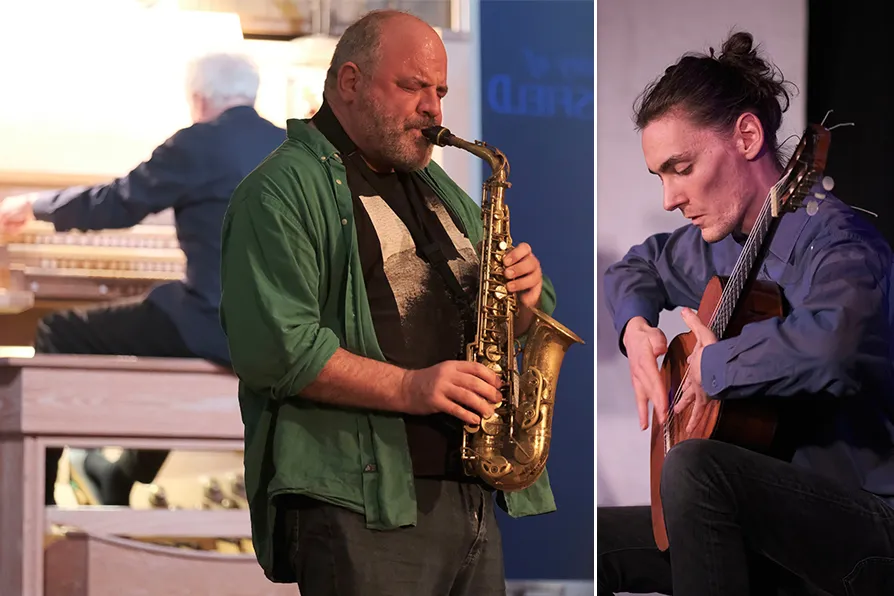JOHN GREEN, MARIA DUARTE and ANGUS REID review Fukushima: A Nuclear Nightmare, Man on the Run, If I Had Legs I’d Kick You, and Cold Storage
ANGUS REID urges you to visit Britain’s most remarkable - and mind-blowing - festival of contemporary music

 FROM EPIC TO MICROSCOPIC: (L) Heiner Goebbels and Raymond MacDonald perform at St Pauls, Huddersfield; (R) Mark Reid Bulatovic performs Thorkell Nordal’s Animistic Rituals [Pics: © Point Of View]
FROM EPIC TO MICROSCOPIC: (L) Heiner Goebbels and Raymond MacDonald perform at St Pauls, Huddersfield; (R) Mark Reid Bulatovic performs Thorkell Nordal’s Animistic Rituals [Pics: © Point Of View]
THE FIRST Monday of Huddersfield Contemporary Music Festival (HCMF) is the best kept secret in the British cultural calendar.
Running over a week and two weekends, that Monday is programmed for 12 hours solid with performances that run back to back in some of Huddersfield’s finest venues, from the Victorian High Gothic of St Paul’s to the lavish stucco of the town hall; from the clean high-tech of the university to the bare industrial brick of Bates Mill Blending Shed.
The work, including British and world premieres, is by the very best contemporary musicians, young and old, from around the world. And it’s all for free.
If you care to join that audience as it strolls from venue to venue you can be the very first to experience entirely new music; the first to think about it and the first to sense its meaning. The Edinburgh Festival was never this convivial, this curious or this committed. What might be perceived to be an elite, niche art-form reveals itself to be the opposite: it’s diverse, generous and inviting. And beyond inviting. Mind-blowing.
Founded in 1978 in the era of the monumental postwar composers Berio and Xenakis, the veterans now are the purveyors of “spontaneous composition,” musicians who are virtuosos of their instrument, creating one-off sonic events.
So, my first gig was a spontaneous collaboration between German keyboardist and composer Heiner Goebbels and guitar legend Fred Frith, whom he had only met 30 minutes before. Their music for piano and processed guitar seemed at first to complement the fractured and dissonant cityscape of capitalist Britain, such as circle the venue, in a probing, disenchanted conversation of provocation and response that raised each instrument to moments of transcendence, often driven by Frith’s mastery of rock guitar, both using and disassembling its authority.
But even this conversation between titans was, for me, upstaged three hours later when Goebbels improvised from the organ with saxophone maestro Raymond MacDonald. This inspired combination was a fight for supremacy that pitted the baroque against the modern, machine-powered flutings and rumbles against a single pair of human lungs, and in the grandeur of St Paul’s, Heaven itself against Satan, the Rebel Angel. To hear it was like witnessing a dramatic and ferocious version of Paradise Lost; Milton condensed down to its two major protagonists, both at full power.
MacDonald fought with furious flurries of sound and the melodic clarity of the sax against, so it seemed, the massed power of Protestant Christianity, eager to crush this serpentine escapee under its divine jackboot. This was a once-in-a-lifetime encounter between two fearless improvisers who, again, had only met minutes before the gig. To provoke, and to catch such music is the genius of HCMF, and both performances will be available to hear on Radio 3’s New Music show.
Such is the informality of HCMF that I could ask Goebbels immediately after the gig how he had prepared. The only idea, he assured me, was that the sax would play the opening notes. When I gave him my impression of the music he stared blankly: “Milton?” he asked, and you could see the paradox of such composition: while the making is entirely in the hands of the player, the meaning is entirely surrendered to the audience.
But landmark events like these took their place modestly alongside other work by much younger musicians in complete equality. Can you imagine the mental gear-change, going from a War in Heaven to the contemporary raga of Supriya Nagavajan, the only concert I have ever listened to, as bidden, with eyes closed and breathing in rhythm with everyone else in the room, a music entirely removed from showmanship and ego?
In such ways this astonishing festival inverts, rearranges and transcends your assumption of what music is, and does so by making a democratic, egalitarian offer.
Formal composition — sounds read from a score — now find themselves in the hands of a younger generation, exploring not the sound of mass movement like their forebears, but individualised themes with microscopic attention to detail.
Such was Thorkell Nordal’s Animistic Rituals which the guitar’s relationship to its player is explored from the guitar’s point of view — its silence, its woodenness, its scratchiness and its indifference to the canon of previous music. In a performance of dramatic virtuosity Mark Reid Bulatovic enacted the other side of this demanding, recalcitrant relationship infusing his performance with breath, voice and a dangerous glee, his classically trained mastery of the instrument in evidence, but never to the fore.
On other days performances can be longer and another such ambitious composition was the composer in residence, Sarah Hennies’ The Blue Hour that explores a process like therapy between a queer and autistic violin and the psychodynamic opportunities created by the piano, offering themes to imitate and a supportive sense of rhythm.
Does this generational cross-section of contemporary music mirror changes in our times, from post-war social vision, through virtuoso individualism to identity politics? This great festival gives you the chance to contemplate such vistas, with astonishing generosity.
Runs until November 30. For more information see: hcmf.co.uk. For recording of festival performances see BBC Radio 3 New Music show.









